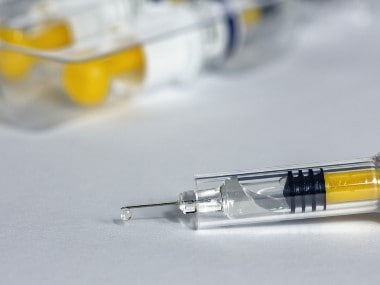Remdesivir is a broad-spectrum antiviral medicine that has got significant public attention for its possible benefits in the treatment of COVID-19. A nucleoside analogue drug, Remdesivir was developed by a US-based biopharmaceutical firm, Gilead Sciences, to fight against Ebola. Both lab and animal studies have shown that remdesivir is effective against SARS and MERS virus. This is significant because both SARS and MERS are coronaviruses; they belong to the same family as SARS-CoV-2, the coronavirus responsible for the ongoing COVID-19 pandemic. [caption id=“attachment_8324871” align=“alignleft” width=“380”]  Representational image. Image by Willfried Wende from Pixabay.[/caption] Nucleoside analogue is a reference to the molecular structure of Remdesivir. It means that the drug contains a nitrogenous base with carbon sugar. This type of antiviral prevents the virus from making more copies of itself inside the human body. Once the virus is no longer able to replicate, the infection starts to clear up. Here’s everything you need to know about remdesivir and why it is being used to treat severely ill COVID-19 patients:
1. Has the US allowed emergency use of remdesivir? Is remdesivir approved by the US Food and Drug Administration (FDA)?
On May 1, the US FDA approved the remdesivir for emergency use in hospitalised patients with severe COVID-19 only - this approval is temporary, as it had to be expedited to help patients who are in critical condition. The drug may reportedly be used in 5-day or 10-day treatment durations, depending on the severity of the disease. However, this authorisation is not permanent. Remdesivir is still an investigational drug that needs to get authorisation from the FDA.
2. Does India manufacture remdesivir? What’s ICMR’s stand on it?
Currently, Gilead owns the patent for remdesivir in India. The patent was granted as early as February 2020. However, as per media reports, the biopharma company is likely to announce licencing agreements with local pharmaceutical firms to let them make a generic version of the drug in the country. Meanwhile, various pharmaceutical companies in India ranging from Cipla, Dr Reddy’s and Glenmark have already started working on developing the active pharmaceutical ingredients or the raw materials of remdesivir in India. For now, all these companies are reportedly allowed to produce this drug for research purpose only - the drug in under patent for at least up to 2030.
3. How does Remdesivir work?
Remdesivir is a nucleoside analogue. Studies show that it competes with ATP (adenosine triphosphate) during the production of viral RNA. Viruses are intracellular parasites. Once they get inside healthy cells, they use the machinery and materials from these cells to make copies of their own nucleic acid. RNA or ribonucleic acid is the genetic material of SARS-CoV-2. Every RNA is made of a series of four nucleotide bases arranged in various ways to code for specific characters or make specific proteins. These bases include ATP, GTP, CTP and UTP. An enzyme called RNA polymerase makes new RNA copies which are then used to make new viruses. Remdesivir, when it gets integrated in place of ATP during the formation of RNA, completely halts the replication process. No replication means no new RNA and no new virus.
4. Are there any side-effects of the drug?
Remdesivir is still under investigation. So the side effects are not well known. However, as per the FDA, two possible side effects of remdesivir are as follows:
- Increase in the levels of liver enzymes, indicating that it may negatively affect the liver. Before giving remdesivir to a patient, doctors check their liver health through various blood tests.
- Infusion-related reaction during the administration of the drug. It shows up as nausea, vomiting, shivering, sweating and low blood pressure.
For more information, read our article on COVID-19 Treatment: All you wanted to know about Remdesivir. Health articles in Firstpost are written by myUpchar.com, India’s first and biggest resource for verified medical information. At myUpchar, researchers and journalists work with doctors to bring you information on all things health.


)

)
)
)
)
)
)
)
)



